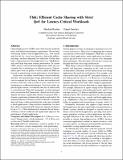Ubik: efficient cache sharing with strict qos for latency-critical workloads
Author(s)
Kasture, Harshad; Sanchez, Daniel
DownloadSanchez_Ubik.pdf (329.1Kb)
OPEN_ACCESS_POLICY
Open Access Policy
Creative Commons Attribution-Noncommercial-Share Alike
Terms of use
Metadata
Show full item recordAbstract
Chip-multiprocessors (CMPs) must often execute workload mixes with different performance requirements. On one hand, user-facing, latency-critical applications (e.g., web search) need low tail (i.e., worst-case) latencies, often in the millisecond range, and have inherently low utilization. On the other hand, compute-intensive batch applications (e.g., MapReduce) only need high long-term average performance. In current CMPs, latency-critical and batch applications cannot run concurrently due to interference on shared resources. Unfortunately, prior work on quality of service (QoS) in CMPs has focused on guaranteeing average performance, not tail latency.
In this work, we analyze several latency-critical workloads, and show that guaranteeing average performance is insufficient to maintain low tail latency, because microarchitectural resources with state, such as caches or cores, exert inertia on instantaneous workload performance. Last-level caches impart the highest inertia, as workloads take tens of milliseconds to warm them up. When left unmanaged, or when managed with conventional QoS frameworks, shared last-level caches degrade tail latency significantly. Instead, we propose Ubik, a dynamic partitioning technique that predicts and exploits the transient behavior of latency-critical workloads to maintain their tail latency while maximizing the cache space available to batch applications. Using extensive simulations, we show that, while conventional QoS frameworks degrade tail latency by up to 2.3x, Ubik simultaneously maintains the tail latency of latency-critical workloads and significantly improves the performance of batch applications.
Date issued
2014-03Department
Massachusetts Institute of Technology. Computer Science and Artificial Intelligence Laboratory; Massachusetts Institute of Technology. Department of Electrical Engineering and Computer ScienceJournal
Proceedings of the 19th international conference on Architectural support for programming languages and operating systems (ASPLOS '14)
Publisher
Association for Computing Machinery (ACM)
Citation
Harshad Kasture and Daniel Sanchez. 2014. Ubik: efficient cache sharing with strict qos for latency-critical workloads. In Proceedings of the 19th international conference on Architectural support for programming languages and operating systems (ASPLOS '14). ACM, New York, NY, USA, 729-742.
Version: Author's final manuscript
ISBN
9781450323055